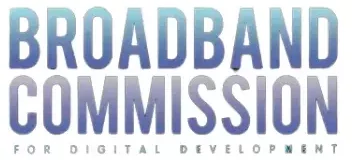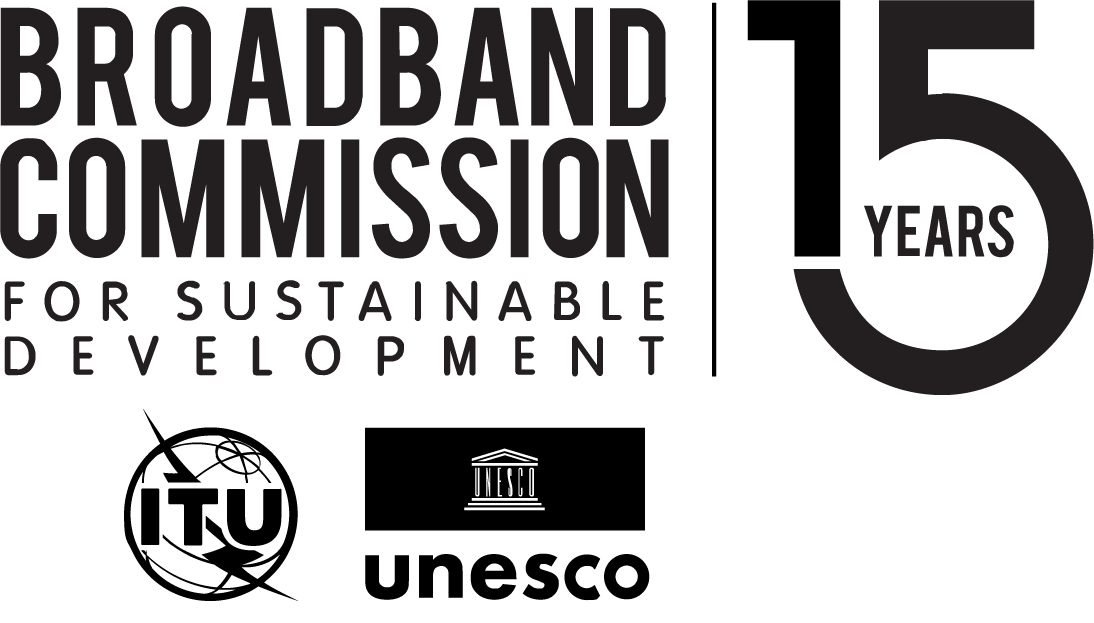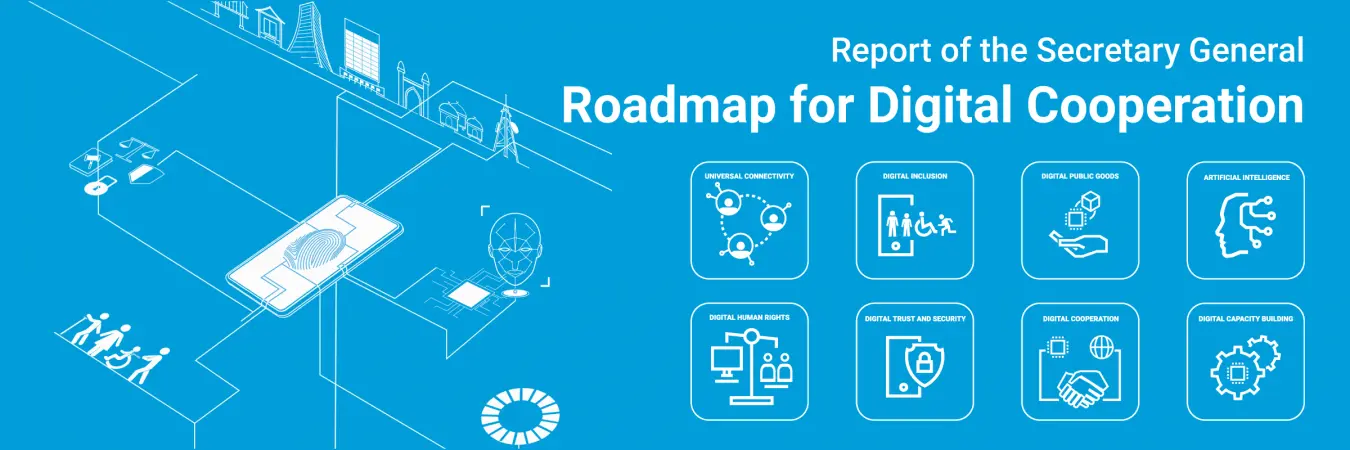15 years of broadband advocacy
Since 2010, the Broadband Commission for Sustainable Development has been a driving force in promoting universal connectivity and broadband for sustainable development. As we celebrate our 15th anniversary, we reflect on a legacy of high-level advocacy, impactful initiatives, and global partnerships that have shaped the digital landscape.
Our legacy
From the beginning, the Broadband Commission has engaged in high-level advocacy to promote universal connectivity. One of the central roles of the Commission has been to leverage its high-profile Commissioners to advocate for prioritizing the development of broadband infrastructure and services. The goal: to ensure the benefits of broadband technology are realized globally and to spread the message of “Broadband for Sustainable Development” at key events, conferences, and functions.
To date, the Commission’s outcomes include:
- The annual State of Broadband Report: Published annually since 2010, offering a comprehensive overview of progress and challenges in broadband connectivity.
- Almost 40 Working Groups: Tackling thematic areas such as health, education, and gender equality, producing actionable recommendations to drive universal connectivity.
- Bi-Annual Meetings: Bringing together Commissioners and global leaders to track progress, share insights, and plan action.
- Inputs to the UN key processes and resolutions.
Global initiatives catalyzed by the Commission
The Broadband Commission has also been instrumental in launching transformative global initiatives, including:
- EQUALS: The Global Partnership for Gender Equality in the Digital Age
- Giga: The ITU/UNICEF Global Initiative to Connect Every School to Internet by 2030
- Child Online Safety Universal Declaration
As we mark 15 years of leadership and impact, the Broadband Commission’s commitment to advancing meaningful connectivity remains as relevant as ever, as one-third of the global population is still offline.
Explore our timeline to discover the key moments that have defined our journey.
Founding

In May 2010, the ITU and UNESCO established the Broadband Commission for Digital Development in response to UN Secretary-General Ban Ki-Moon’s call to step-up UN efforts to meet the Millennium Development Goals (MDGs)
Broadband Targets for 2015
In 2011, the Commission launched it first Strategic Framework: Broadband Targets for 2015, which included four targets focused on making broadband policy universal and increasing affordability and broadband use. In 2013, Targets 5 and 6 were added to recognize the need for the increased use of e-finance services and improvement of connectivity for MSMEs for inclusive and sustainable development.
2010
Thematic Outputs
Between 2010 and 2015, the Commission published five annual State of Broadband Reports, three open letters to HLPF, G-20 Meeting, and PP-14, one call to action to Rio+20 Conference, one Manifesto, and 12 Working Group reports on the topics of Multilingualism, LDCs, Broadband & Science, Climate Change, E-Government, Digital Health, Gender, Education, Broadband Taskforce, Finance & Investment, Youth Platforms for the SDGs. The Commission hosted 10 Annual meetings and participated in special advocacy sessions.
Thematic Outputs
Between 2016 and 2020, the Commission published 5 annual State of Broadband Reports, 4 Open Statements to World Humanitarian Summit, HLPF, UN Habitat III, COP-22, and 16 Working Group reports on the topics of: Demand, Digital Health, Child Online Safety, Digitalization Scorecard, Digital Gender Divide, Education, Vulnerable Countries, Tech in Space, Entrepreneurship, Digital Health, Epidemic Preparedness, Moonshot for Africa, School Connectivity, Disinformation and AI & Health. The Commission hosted 8 Annual Meetings and participated in special advocacy sessions.
2015
Aligning with the SDGs and Extending Advocacy Targets to 2025
In September 2015, the UN Sustainable Development Goals (SDGs) succeeded the Millennium Development Goals (MDGs) as the international policy framework for socio-economic development and poverty reduction. In 2016, the Broadband Commission recognized broadband as a fundamental element for achieving all 17 goals and extended its timeline to 2025.
Digital Gender Equality Initiatives Catalyzed
In 2017, the Working Group on Digital Gender Divide recommended collaborative, multistakeholder action through engagement in the Global Partnership to Bridge Gender Digital Divide – EQUALS. In the same year, Advocacy Target 7 on Gender Equality was introduced with the goal of achieving gender equality across all targets.
School Connectivity Initiatives Catalyzed
In 2019, the Working Group on School Connectivity provided advice for the development of two global initiatives aimed at connecting schools to the Internet: Giga and UNESCO’s e-schools Initiative.
Response to COVID-19
In 2020, the Commission published the Agenda for Action, a repository of tangible short- and medium-term approaches for leveraging connectivity to mitigate the impact of the pandemic and ease the immediate adverse impacts for economies and societies.
Roadmap for Digital Cooperation
In June 2020, UN Secretary-General Antonio Guterres presented the Roadmap for Digital Cooperation, outlining practical policy approaches for a digitally interdependent world. The roadmap references the 2025 Advocacy Targets of the Broadband Commission, as well as the “Connecting Africa through Broadband” Working Group report.
Co-Vice Chair Ms. Doreen Bogdan-Martin took office as Secretary-General of the ITU
On 1 January 2023, Ms. Doreen Bogdan-Martin took office as Secretary-General of the International Telecommunication Union (ITU) and assumed the role of Co-Vice Chair of the Broadband Commission.
2020
10th Anniversary & Manifesto
In 2020, the Broadband Commission celebrated its 10-year Anniversary with the publication of a Special Edition of its flagship State of Broadband Report, in which it reexamined its historical policy recommendations and purpose. The Commission also published a Manifesto to establish and have the Commission endorse its goal of Universal Connectivity.
Thematic Outputs
From 2020-2024, the Commission published 5 State of Broadband reports, 6 Open Statements: Inputs to WSIS, Digital Global Compact, HLPF, LDC5 and the Transforming Education Summit, 6 thematic Working Groups reports on the topics of: MSME Connectivity, Data for Learning, Smartphone Access, AI Capacity Building, Virtual Health and Care, 21st Century Financing Models, Digital Learning, and Epidemic Management, 5 videos in its Broadband Transforming Lives advocacy campaign, hosted side events and participated in major conferences and events including but not limited to STI Forum, MWC, CSW, IWD, COP29, SDG Digital, and submitted an Advocacy Pledge to Partner2Connect (P2C).
Our 15th Anniversary & review of the 2025 Broadband Advocacy Targets

In 2025, the Broadband Commission will focus on reviewing the progress made in achieving each of the seven 2025 Broadband Advocacy Targets. As we near the expiration of these targets, we will reflect on the significant strides taken over the past 15 years and assess areas where further action is needed. This will be a pivotal year for shaping the next phase of broadband advocacy, ensuring that universal connectivity remains at the forefront of the global development agenda.
2010
Founding

In May 2010, the ITU and UNESCO established the Broadband Commission for Digital Development in response to UN Secretary-General Ban Ki-Moon’s call to step-up UN efforts to meet the Millennium Development Goals (MDGs)
Thematic Outputs
Between 2010 and 2015, the Commission published five annual State of Broadband Reports, three open letters to HLPF, G-20 Meeting, and PP-14, one call to action to Rio+20 Conference, one Manifesto, and 12 Working Group reports on the topics of Multilingualism, LDCs, Broadband & Science, Climate Change, E-Government, Digital Health, Gender, Education, Broadband Taskforce, Finance & Investment, Youth Platforms for the SDGs. The Commission hosted 10 Annual meetings and participated in special advocacy sessions.
Broadband Targets for 2015
In 2011, the Commission launched it first Strategic Framework: Broadband Targets for 2015, which included four targets focused on making broadband policy universal and increasing affordability and broadband use. In 2013, Targets 5 and 6 were added to recognize the need for the increased use of e-finance services and improvement of connectivity for MSMEs for inclusive and sustainable development.
Aligning with the SDGs and Extending Advocacy Targets to 2025
In September 2015, the UN Sustainable Development Goals (SDGs) succeeded the Millennium Development Goals (MDGs) as the international policy framework for socio-economic development and poverty reduction. In 2016, the Broadband Commission recognized broadband as a fundamental element for achieving all 17 goals and extended its timeline to 2025.
Digital Gender Equality Initiatives Catalyzed
In 2017, the Working Group on Digital Gender Divide recommended collaborative, multistakeholder action through engagement in the Global Partnership to Bridge Gender Digital Divide – EQUALS. In the same year, Advocacy Target 7 on Gender Equality was introduced with the goal of achieving gender equality across all targets.
School Connectivity Initiatives Catalyzed
In 2019, the Working Group on School Connectivity provided advice for the development of two global initiatives aimed at connecting schools to the Internet: Giga and UNESCO’s e-schools Initiative.
Roadmap for Digital Cooperation
In June 2020, UN Secretary-General Antonio Guterres presented the Roadmap for Digital Cooperation, outlining practical policy approaches for a digitally interdependent world. The roadmap references the 2025 Advocacy Targets of the Broadband Commission, as well as the “Connecting Africa through Broadband” Working Group report
Response to COVID-19
In 2020, the Commission published the Agenda for Action, a repository of tangible short- and medium-term approaches for leveraging connectivity to mitigate the impact of the pandemic and ease the immediate adverse impacts for economies and societies.
10th Anniversary & Manifesto
In 2020, the Broadband Commission celebrated its 10-year Anniversary with the publication of a Special Edition of its flagship State of Broadband Report, in which it reexamined its historical policy recommendations and purpose. The Commission also published a Manifesto to establish and have the Commission endorse its goal of Universal Connectivity.
Co-Vice Chair Ms. Doreen Bogdan-Martin took office as Secretary-General of the ITU
On 1 January 2023, Ms. Doreen Bogdan-Martin took office as Secretary-General of the International Telecommunication Union (ITU) and assumed the role of Co-Vice Chair of the Broadband Commission.
Thematic Outputs
From 2020-2024, the Commission published 5 State of Broadband reports, 6 Open Statements: Inputs to WSIS, Digital Global Compact, HLPF, LDC5 and the Transforming Education Summit, 6 thematic Working Groups reports on the topics of: MSME Connectivity, Data for Learning, Smartphone Access, AI Capacity Building, Virtual Health and Care, 21st Century Financing Models, Digital Learning, and Epidemic Management, 5 videos in its Broadband Transforming Lives advocacy campaign, hosted side events and participated in major conferences and events including but not limited to STI Forum, MWC, CSW, IWD, COP29, SDG Digital, and submitted an Advocacy Pledge to Partner2Connect (P2C).
Our 15th Anniversary & review of the 2025 Broadband Advocacy Targets

In 2025, the Broadband Commission will focus on reviewing the progress made in achieving each of the seven 2025 Broadband Advocacy Targets. As we near the expiration of these targets, we will reflect on the significant strides taken over the past 15 years and assess areas where further action is needed. This will be a pivotal year for shaping the next phase of broadband advocacy, ensuring that universal connectivity remains at the forefront of the global development agenda.


